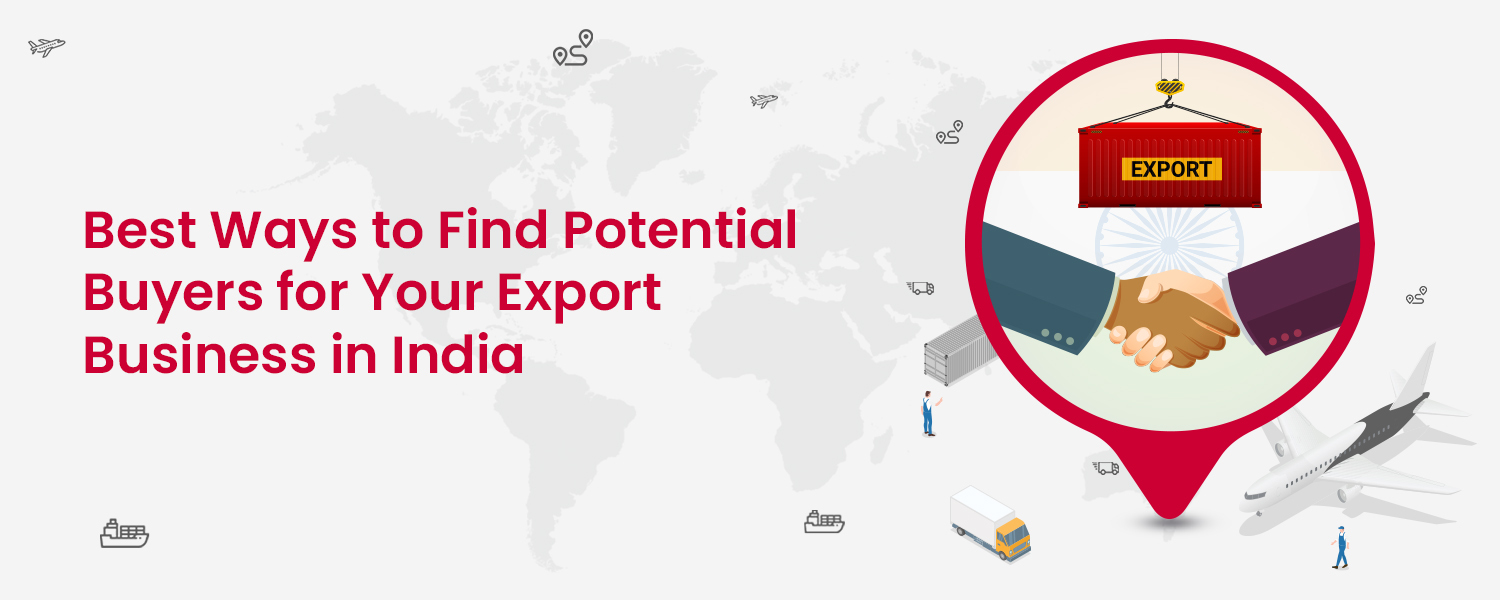You’ve just created the perfect product that you’re certain will be a game-changer in international markets. But you don’t know how to get your product into the hands of international buyers. You’re not alone if you’ve ever found yourself in this situation.
The global marketplace is not just a click away; it’s a labyrinth of cultural nuances, language intricacies, and logistical hurdles.
But here’s the silver lining: technology has revolutionized how we conduct business, making the world smaller and more accessible. Today, a well-optimized website, a strategic social media presence, or even a simple Google search can open doors to markets you didn’t even know existed.
So, why should you keep reading? This blog is your comprehensive guide to mastering the art of finding buyers and how to export from India. By the end of this read, you’ll know how to find buyers and negotiate, build relationships, and adapt to new markets like a pro.
Understanding the Fundamentals of Export in India
India has a rich history of trade and commerce that dates back to ancient times. Today, India is one of the world’s fastest-growing economies, with exports playing a pivotal role in that growth.
Talking about something crucial for export success. It’s essential to understand the economic conditions of your target country before you even think about exporting. Are they experiencing growth or going through a recession? A growing economy will likely have a higher demand for imported goods, making it a ripe market for your products.
If you’re selling luxury items, you’ll want to focus on markets with higher disposable incomes. On the other hand, if you’re exporting essential goods like food products or pharmaceuticals, even countries with lower disposable incomes could be lucrative markets.
Last but certainly not least, you must consider the tariffs, taxes, and import quotas imposed by the target country. High tariffs can make your products less competitive, while import quotas could limit the volume of goods you can export.
Understanding these factors can help you strategically price your products and even negotiate better terms with foreign buyers.
Ways to Find Buyers to Export from India
Traditional Methods of Finding Buyers
Foreign Agencies
Foreign agencies act as intermediaries between exporters and potential buyers in the target country. They deeply understand the local market, consumer behaviour, and regulatory landscape, making them invaluable assets for any exporter.
Start by conducting thorough research on potential agencies, focusing on their track record, reputation, and expertise in your industry. Ask for references and case studies to understand how they’ve helped other businesses succeed. It’s also crucial to discuss terms, including commissions, contractual obligations, and the scope of services offered, to ensure that the partnership is mutually beneficial.
Foreign Wholesalers
Unlike government agents, private wholesalers often make decisions quicker and can offer more flexible terms. They usually have an established network of retailers and distributors, providing you with immediate access to a broad customer base.
Buying Agents
Buying agents serve as local representatives in the target market and are especially useful for exporters new to a particular region. They have extensive contacts and insights into where your products could be most effectively placed. In the past, finding a reliable buying agent could be a cumbersome process, involving extensive travel and networking.
However, today’s platforms like LinkedIn and industry-specific online directories have made connecting with experienced buying agents easier than ever.
Trade Fairs and Exhibitions
Trade fairs and exhibitions offer a platform for networking and building relationships with potential buyers, suppliers, and competitors. These events gather industry-specific stakeholders from around the globe, offering you a unique opportunity to showcase your products to a targeted audience.
You can provide live demonstrations, answer real-time queries, and most importantly, understand potential buyers’ needs and pain points. These insights are often difficult to glean from digital interactions.
Governmental Support in Finding Export Buyers
Export Promotion Council
The Export Promotion Council (EPC) is a government body specifically designed to facilitate and promote exports from India. Acting as a liaison between the government and exporters, they offer a wealth of resources, including market research, trade data, and even legal guidance, to help you navigate the intricacies of international trade.
EPCs organize trade fairs within India and overseas where you can showcase your products to a global audience. They also conduct workshops and training programs to enhance exporters’ skills and knowledge.
By becoming a member and obtaining a Registration cum Membership Certificate (RCMC), you gain access to a network of verified buyers.
Indian Embassies
Indian Embassies and Consulates worldwide serve as a treasure trove of trade-related information. These diplomatic missions have their fingers on the pulse of the local market and can provide real-time insights into consumer behavior, buyer lists, market trends, and even regulatory changes that could impact your business.
Moreover, embassies can also assist in verifying the credibility of potential buyers, thereby mitigating risks associated with international trade.
Online Methods of Finding Buyers for Your Export Business
Building a Professional Website
A well-designed, professional website can be your most potent tool in attracting international buyers. It’s not just a place where potential buyers can find you. It’s a platform where you can establish your brand’s credibility, showcase your products, and even conduct business transactions.
Best practices for building a professional website include a clean design, intuitive navigation, and high-quality images of your products. Your website should also be optimized for search engines (SEO), mobile-responsive, and equipped with fast loading times. Remember, you’re catering to a global audience, and slow load times can be a deal-breaker.
Search Engine Marketing (SEM)
While SEO helps in organic ranking, search engine marketing can place your website at the top of search engine results through paid advertising. This is crucial for increasing your online visibility, especially in international markets that are saturated or highly competitive.
Google Search Console
Google Search Console is a website management tool by Google. It provides insights into how Google’s search algorithms view your website, allowing you to optimize for better ranking. From indexing status to search queries that lead to your website, it offers a plethora of data that can be invaluable for your export business.
Social Media Strategy
Social media can be a great business tool that can help you reach millions of potential buyers worldwide.
For B2B exporters, LinkedIn is often the go-to platform. It allows you to connect with business professionals and decision-makers directly. LinkedIn Groups also offer a space to engage in meaningful discussions, showcase your expertise, and subtly promote your products.
Twitter and Facebook are excellent for real-time engagement. Twitter’s hashtag feature can help you tap into trending topics related to your industry, while Facebook’s robust ad platform allows for highly targeted advertising.
B2B Websites
Business-to-business (B2B) websites have emerged as digital matchmakers, connecting exporters with importers from around the globe. Platforms like Alibaba, Indiamart, and DHGate offer an entire ecosystem that provides services, from showcasing products to facilitating transactions.
These international buyer websites also offer value-added services like logistics support, quality inspection, and secure payment methods, making the entire export process smoother. However, it’s essential to do your due diligence before entering into any transaction. Always check buyer ratings and reviews and preferably communicate directly before closing a deal.
Conclusion
From leveraging the power of traditional methods to harnessing the digital dynamism of online platforms and social media, the avenues are as diverse as they are promising.
The more you know about your target market, the economic conditions, and the consumer behavior, the better you can tailor your export strategies. And let’s not forget the most crucial part of the import-export business. That is international shipping.
Yes, logistics can differentiate between a successful exporter and an unsuccessful one. Many businesses fail here, so allow NimbusPost to be your one-stop solution for all your shipping needs.
NimbusPost enables global import and export seamlessly with leading international courier services. Plus you’ll also get professional support in port-to-port freight forwarding and freight transportation, real-time tracking, courier recommendations engine, and much more.
FAQs
How do I find European buyers?
Finding European buyers for your products or services involves a multi-faceted approach combining traditional and digital strategies. Here’s how to go about it:
- Visit Trade Fairs in Europe or Online: Participate in industry-specific trade fairs and exhibitions. These events are hotspots for meeting potential buyers and networking with industry professionals.
- Use Member Lists of European Trade Association: Leverage the databases of European trade associations related to your industry.
- Attract Buyers to Your Website: Optimize your website for search engines and use targeted content to attract European buyers.
- Register with Trade Directories: List your business in reputable European trade directories. This increases your visibility and credibility.
How do I find buyers in Germany?
To find genuine buyers in Germany, consider the following steps:
- Online Trade Directories: Utilize reputable online trade directories like Volza, Yellow Pages, or Germany Business Directory to search for businesses in your industry.
- B2B Marketplaces: Platforms like Alibaba and TradeIndia often have listings of German buyers.
- Digital Marketing: Use targeted online advertising to reach German businesses likely to be interested in your products.
- Local Agents: Consider hiring a local German agent who understands the market and can directly connect you with buyers.




